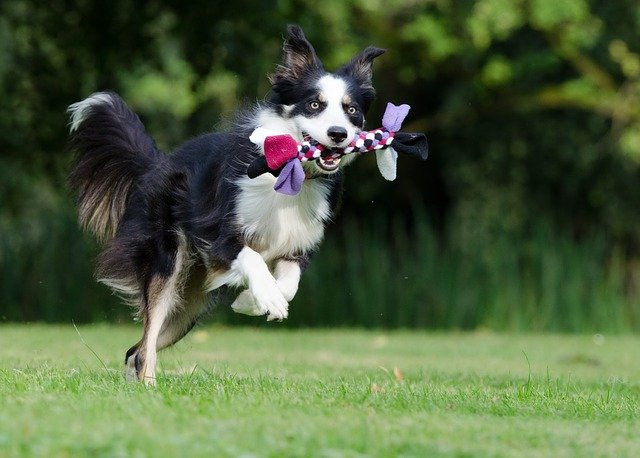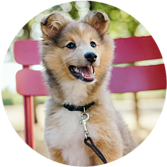Puppies’ mouths are filled with about 28 teeny-tiny razors that seem to be attracted to your fingers or toes. Dog trainers call it “play biting”, but it’s irksome and often painful when your cuddly pup seems to be all teeth. However, this is completely normal for puppy teething and necessary for development, and something you can train away with a few simple steps.
Teach Your Puppy Bite Inhibition
Learning how to moderate the force of a bite is very important for all dogs. There may come a time when they’re in pain or fearful, and they put their mouth on you or someone else. But if they’ve learned bite inhibition, they understand that they shouldn’t bite down hard. Puppies naturally nip at each other while playing. If they bite too hard on their mother or litter mate, the other dog will likely make a loud yelp sound, warning the puppy, “Hey that hurt!”

Depending on the dog, you can teach this, as well, by making a high-pitched “ow!” sound it they bite you. Beware though, because, for some puppies, this actually gets them even more worked up and likely to bite. In this case, it is better to turn quietly around, walk away or gently put the pup into their crate for a few minutes to calm down. If they do back off be sure to reward your dog with a treat and some verbal praise.
Teach your Puppy that Biting means “Game Over”
If your puppy bites you while playing, that means playtime is over, with no exceptions. Yelling at or physically punishing your puppy, as strange as it sounds, is also a type of reward. It teaches them that biting gets some kind of response from you, which is known as negative reinforcement. This can also make them fearful of being handled. Instead, teach them that biting will get them nothing. Many dog trainers, suggest turning around and tucking your hands into your armpits.
It’s actually a calming signal and minor form of attention withdrawal. Be careful not to roughhouse with your young pup in ways that only encourage them to lose control and bite you.

Give your Puppy an Alternative Item to Chew
It’s always a good idea to keep a puppy chew toy at hand at all time, so you can anticipate biting behavior and substitute the toy for your hand or furniture. Doing so will let pups know what is OK to bite or chew. If they start nibbling at your fingers or toes while you’re playing, offer a toy instead.
Again, if they continue to nip, stop the play session immediately. If you’ve been training your puppy to sit, you might also redirect them by asking them to sit and rewarding with a toy.
Put Them in Time Out
Gently put your puppy in their crate to give them a chance to calm down and prevent them from biting. It’s very important to make sure that they don’t learn to associate the crate with punishment, so be calm. Once the pup calms down, you can let them out.
Offer Quiet Time or a Potty Break
Sometimes a biting puppy is really an over-tired puppy, and they need to be put in a quiet space of crate to take a nap. Other time, they may need a potty break, or may just be hungry or thirsty.
Help Use Up Some Energy
When the puppy keeps biting, even after you substitute a toy several time, the may just need to burn up some physical or mental energy. Take them in the yard and watch them run around, maybe even for a long walk to help release some energy.

Never Hit Your Dog
Never, ever hit or otherwise physically punish your dog. If your pet seems to be biting out of aggression, speak to a veterinarian or dog trainer about ways to manage that behavior.
Patience & Consistency
 Teaching your little manic play biter to be polite with their mouth may seem like a huge challenge at first. Patience and consistency are the keys. Some puppies may back off during one play session, and come at you teeth first the next.
Teaching your little manic play biter to be polite with their mouth may seem like a huge challenge at first. Patience and consistency are the keys. Some puppies may back off during one play session, and come at you teeth first the next.
Play biting does not mean your puppy is vicious. However, if you haven’t been able to moderate the behavior by the time they’re six months old, it’s a good idea to consult an experienced dog trainer or animal behavior specialist.